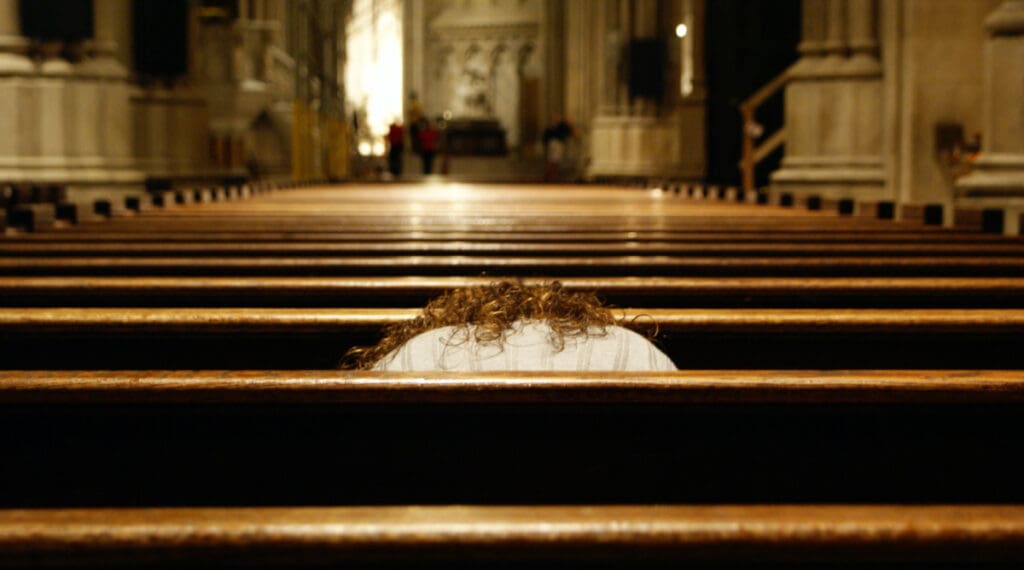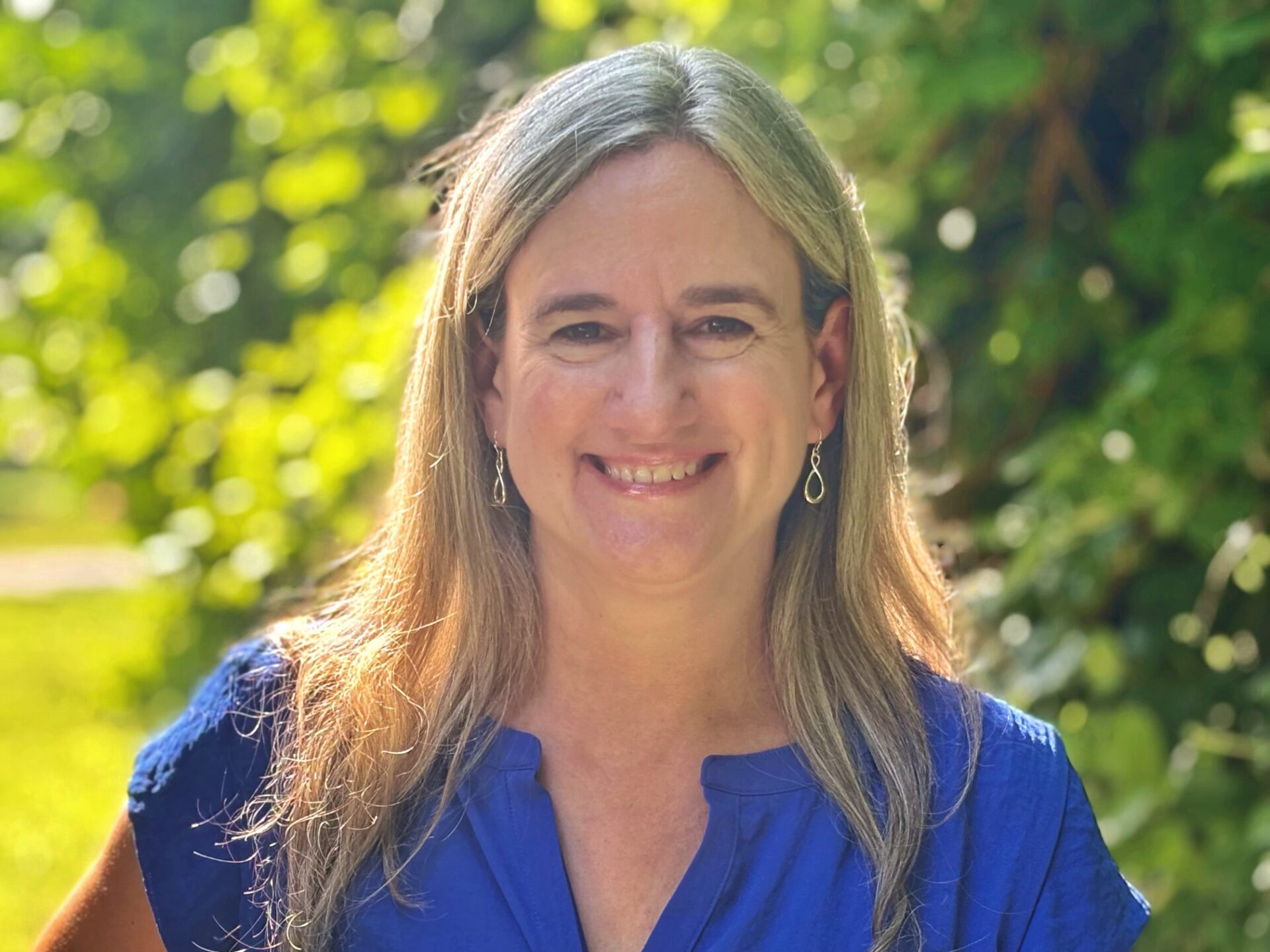C.S. Lewis once wrote that God “whispers in our pleasures, but shouts in our pain.” Years ago, l was living a “season of shouting”—when I was wrestling with deep spiritual longing and angst, but not yet recognizing God’s voice in my own cries.
I had been working for the church for many years, as a teacher, a speaker, the director of a catechism program in New York City. I had an MA and countless theology talks and retreats under my belt. But I sat in the pew in a church on 75th street wondering to myself, “Is the Gospel really good news?”
It didn’t feel like it.
It felt like a tremendous weight, a burden, that I struggled to live out in faith but always fell short. I was burnt out from trying so hard, from wrestling, from wanting something more but experiencing only dryness and longing in prayer. I wished at times that I had been born invincibly ignorant of the Gospel, and all of its demands. Was I really doing anyone a favor by inviting them into this struggle? Surely there had to be more than this!
I read stories about people who while living as prodigal sons sensed “something missing” only to find it in the Church and came home to great rejoicing. Yet I had lived my whole life in the Church, and still felt an absence, an emptiness, a profound lack of joy. Like the prodigal’s older brother, I wondered, “Where is my feast?”
This came to a head when I went to a talk given by a convert to Christianity, who had been a real-life prostitute. Her story was one of incredible pain and brokenness: she was molested at a young age and then trafficked by her own father. After running away from home, she turned to prostitution to survive life on the streets. She had two abortions, and for a while worked for Planned Parenthood. But when her best friend and fellow prostitute was murdered, she finally made a plan to stop the pain by ending her life.
But there in a hotel room in the middle of the night, with the bottle of pills beside her, she heard Someone call her name. “I love you!” called the voice. She didn’t know who the voice belonged to, but was overwhelmed with an experience of profound love—wondering who could it be that would love someone like her?
She eventually became a Christian and found in Jesus the love she had been searching for all along. As if intoxicated with this love, she was filled with a joy that spilled out to everyone around her. She recounted how one day shortly after her conversion, filled with excitement at being so loved, she stood on a table in a restaurant and began shouting to everyone about how wonderful the love of Jesus was.
As I listened to her speak, the joy and love radiated from her—I could palpably feel it from across the room. She could evangelize more courageously than I, even without trying. I felt like the Pharisee watching the woman at the feet of Jesus, who “has shown great love” pouring out emotions I only wished I could feel.
But I didn’t judge her, I envied her.
“Lord,” I cried. “What do I have to do to experience that kind of love? Seriously. Do I need to become a prostitute? How else can I get what she has?”
I knew that was absurd; I knew that there was nothing in her life to envy, other than that experience of love. But I didn’t know how to find that, and in pain, I shouted my frustration to God.
I wish I could tell you that there was a quick fix, a voice in the night that answered all of my questions and longing and turned everything around. But first, God had to undo the work of some other Voices.
I too was looking for love in all the wrong places. But what the prostitute had sought to find in a sinful lifestyle, I had sought to earn in a virtuous lifestyle.
We both had to learn that love cannot be sold or paid for.
I saw an image of myself like Adam and Eve in the garden, naked and ashamed. In the image, I too sought to cover my nakedness. God showed me a dress that I had carefully crafted—out of toilet paper. Like a small child trying to dress herself, to make herself presentable and pretty, I was nonetheless using materials that could never get the job done. All of my striving, my perfectionism, my trying to earn God’s love through good deeds—in the currency of the kingdom, these were as worthless as toilet paper.
Bishop Barron in his beautiful talk on the Prodigal Son, speaks about the “land of transactions.” The prodigal runs away, but when he has spent all his money finds himself in a place “where no one will give him anything.” That land apart from God is the land of transactions—where all must be earned, paid for: nothing is given freely. The prodigal remembers that even the servants in his father’s house “have enough to spare”, and so returns home.
The older brother, notes Bishop Barron, although remaining at home, is also living in a land of transactions. He has been duped by the Opposition Voice into believing that “no one will give him anything”—that he has to work for it, earn it. He angrily reminds his father of all that he has done: “For all these years I have been working like a slave for you, and I have never disobeyed your command, yet you have never given me even a young goat so that I might celebrate with my friends…” (Luke 15:29 NRSVCE, emphasis added)
But the father lovingly chides him: “Everything I have is yours.” All is gift. It cannot be earned; in fact, aiming to earn can itself become an obstacle.
The invitation to the older brother in the Gospel is left open—we don’t know how he decided. In my own story, it has been an ongoing invitation, as I have learned to receive from God, to discover what it is like to live in a place of gift and grace rather than of duty. I had to learn that I had access to all the treasures of the kingdom simply by asking.
I haven’t had to leave the Father’s house to find what was missing. But I have had to go, as C.S. Lewis would also say, “further up and further in.” Over the years I have found new rooms full of treasures and joys I never imagined possible. I have not accessed these rooms by wages, but I am admitted as a child of the Father, who delights in freely giving what can never be paid for.
One day, sometime after the image of the toilet paper dress, I saw God presenting me with a beautiful white gown covered in jewels. His plan was not to leave me naked, but He would provide me clothing as a pure gift. Not the uniform of a servant, but the dress of one chosen for a lifetime as beloved.
Image credit: Deposit Photos




